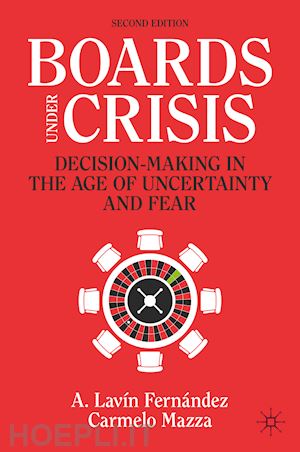
Questo prodotto usufruisce delle SPEDIZIONI GRATIS
selezionando l'opzione Corriere Veloce in fase di ordine.
Pagabile anche con Carta della cultura giovani e del merito, 18App Bonus Cultura e Carta del Docente
Crises, in the past, have been cyclical events in economic history. However, we are currently experiencing an acceleration of these cycles with shorter time span in-between major events. In a period of 20 years, from 2001 to 2021, we have lived three global major crisis events: The Twin Tower Attack on September 11th, 2001, the Financial Crash in 2008, and the Covid-19 pandemic from 2020.
In the first edition of this book, the authors explained the main decision-making patterns of behavior (i.e. short termism, centralization, and parochialism) that characterized the management processes of Boards of Directors during the financial crash. Now, in this revised and updated second edition, the authors explore the main commonalities and differences between decision making at the top during the previous financial crisis and during the most recent Covid 19 global pandemic, as well as during the inception of the war in Ukraine. In doing so they ask, is this a new crisis or just the “new normal” that businesses and organizations need to face after major catastrophic events?
By first reassessing the very meaning of the word ‘crisis,’ the authors explore the relationship between frequent crises, emergency cabinets and socially widespread fear as determinants of a “new normal” rather than as the extraordinary state of our societies. In this sense, the authors identify more nuanced and updated consequences of short termism, centralization and parochialism that could shape the changes after the current crisis and the approach to next crisis to come
1. Boards In Their Environment.- 2. Crisis, What Crisis? Boardroom Crisis in Corporate Settings.- 4. What You Can Do Tomorrow Will Depend Largely on Your Thinking Today: Increased Short Termism and Strategic Myopia During Crisis 5. 'I want to personally check that': Centralization at the Boardroom During Crisis.- 6.The Portrait of Board Life from Within. Parochialism and Conflict at the Top.- 7. Strategic Management and OB 8. Remedies for Defective Decision Making Models Under Crisis.
Alberto Lavín is Strategy Adjunct Professor for IE Business School. Previously a partner with Accenture, the consulting giant, he now heads his own consulting practice and acts as a family business nonexecutive director and advisor. In 2014, he published, together with Carmelo Mazza, “Boards under crisis: board action under pressure”.
Carmelo Mazza holds a PhD in Business Economics from IESE Business School. His research interests focus on decision-making and on creative processes. In the last three decades, he has
taught in leading institutions (among others, Copenhagen Business School, University of Rome “La Sapienza”, and IE Business School) and acted as management consultant and top manager.











Il sito utilizza cookie ed altri strumenti di tracciamento che raccolgono informazioni dal dispositivo dell’utente. Oltre ai cookie tecnici ed analitici aggregati, strettamente necessari per il funzionamento di questo sito web, previo consenso dell’utente possono essere installati cookie di profilazione e marketing e cookie dei social media. Cliccando su “Accetto tutti i cookie” saranno attivate tutte le categorie di cookie. Per accettare solo deterninate categorie di cookie, cliccare invece su “Impostazioni cookie”. Chiudendo il banner o continuando a navigare saranno installati solo cookie tecnici. Per maggiori dettagli, consultare la Cookie Policy.